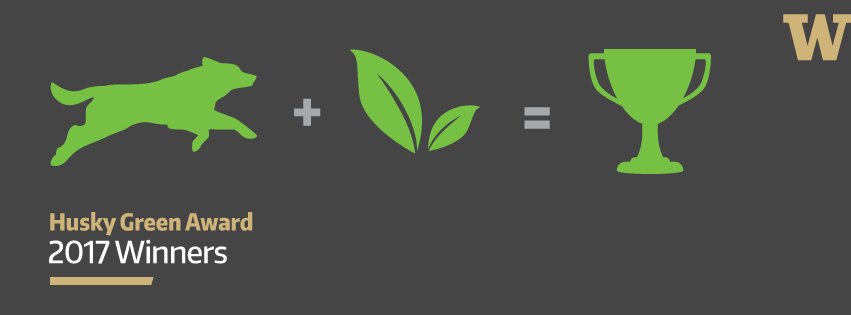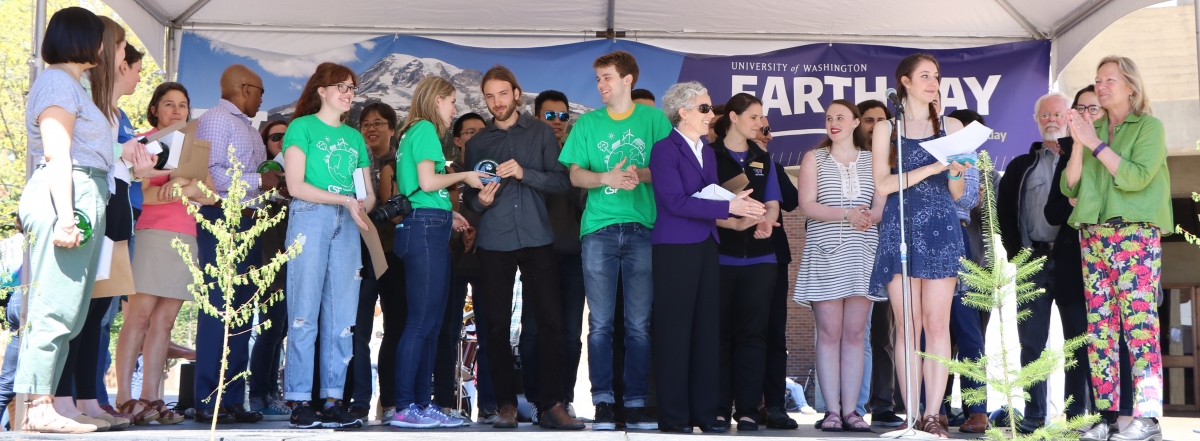The Campus Sustainability Fund (CSF) is a student-run organization which provides grants for student-initiated environmental projects at the University of Washington. By the end of this year, the CSF will have granted more than $2 million to around 100 separate projects since launching in 2010. CSF grant decisions are made by a seven-member student committee, who make decisions on how to allocate approximately $350,000 from the Student Activities Fees each year. Projects funded have included the expansion of the UW Farm, solar panel installations, bike repair stations, a biodiversity green wall, numerous feasibility studies for new technologies and student events. CSF embodies student leadership at the UW. Each year the student committee and student coordinators turn over, yet the CSF has been consistent and thorough with vetting and reviewing project proposals to make sure all funds go toward efforts that directly benefit students.

The Husky Green Awards are celebrating their eighth year of recognizing sustainability leadership at the University of Washington. The award ceremony took place on Friday, April 21, at 1 p.m. during the 2017 Earth Day celebration in Red Square, presented by two-time Husky Green Award winner Talia Haller and UW Bothell Vice Chancellor Ruth Johnston. The Husky Green Awards are given annually to students, faculty and staff from the Seattle, Bothell and Tacoma campuses who show environmental leadership and dedication. See all the 2017 Husky Green Award recipients below, or see the full list of the 2017 nominees.

UW Solar
UW Solar is an interdisciplinary, student-run organization committed to developing solar energy projects on the UW campus and in the greater Seattle area. The group was founded in 2012 to champion a solar installation on the top of Mercer Court A, the first middle-scale solar project on campus. Since then, UW Solar has continued to work with university partners to identify other opportunities for solar installations, and this year was part of an effort with UW and Seattle City Light that installed solar arrays on three other West Campus residence halls as part of a solar testbed. This fall UW Solar became not only a student organization but also a 1-2 credit Vertical Integrated Project (VIP) course, which provides more opportunities for students to remain involved for at least two quarters working on UW Solar projects.
Bethany Staelens
Bethany goes above and beyond to advocate for sustainabliity efforts on campus. She spearheads the UW Tower's "Green Team," where she has been instrumental in several sustainability initiatives, including improving the Tower's waste diversion. She is also a member of the UW Committee for Paper Reduction, where she has been a key figure in many outreach campaigns, including a recent video showcasing the importance of paper reduction on campus. She is pushing sustainability to the next level and always trying to figure out the next way to spread the word on campus.
Cassie Maylor
Cassie has a history of taking on leadership roles in sustainability related projects at the University of Washington. She is heavily involved in two environmental campus student groups, as the co-President of SAGE and the Vice President of Operations of ReThink UW, and is also a student assistant for the UW Buerk Center for Entrepreneurship, where she has helped organize events and coordinated outreach to students for the Alaska Airlines Environmental Innovation Challenge’s Executive Committee.
Gene Woodard
Gene Woodard, director for Facilities Services Building Services, prioritizes main goals of the department - green cleaning, waste diversion, and safety. He champions the Custodial Services Green Cleaning Policy, which constantly researches ways to use less harmful chemicals and to conserve energy and water. He supports making MiniMax the "UW Way" across campus, so all staff and students have the access and the knowledge to sort their waste - and he makes sure that custodial staff know how to dispose of each material. And finally, he takes initiative to reduce illness and/or injuries on campus by supporting training and education across the department - it is crucial to him that the campus is sanitary and employees are safe. UW Custodial Services and UW Recycling have won several national sustainability awards under his leadership.
Judy Twedt
Judy has displayed remarkable creativity and initiative in leading two sustainability efforts on campus: one that engages with labor unions about climate change issues, and one that turns environmental data into widely-heard, artistic sound pieces. These efforts have each been remarkably successful in reaching communities that are not often served by UW outreach efforts. Judy founded a Climate Change Speakers' Bureau which talks to local labor unions about climate change, which has already reached thousands of people in just a few months of existence. She has also led an "environmental infosonics" initiative, which calls attention to environmental problems by representing key datasets with sound. Learn more at UWTV.
Kristi Straus
Kristi Straus is a lecturer in the College’s Environmental Studies program. She is passionate about environmental conservation and effective teaching of environmental topics for students of all ages. Her work focuses on conservation of local marine invertebrates, as well as the science of science education. She not only works to teach her about our current environmental challenges, but she also helps highlight the impact they can make and empowers them to create change.
Sarah Geurkink
Sarah became the UW Farm's first full-time manager in 2013 and expanded the farm's footprint and reach through student engagement, projects and education programs. Through Sarah's leadership, the UW Farm expanded the amount and diversity of produce grown at the farm, as well as the farm's reach. She built partnerships with outside vendors and internal partners, while improving sustainability in operations through projects like worm compost bins, a composting toilet and new buildings for farm use. Under her oversight, the UW Farm created a CSA program and expanded the relationship with Housing and Food Services to offer UW Farm produce to students at locations such as Cultivate and District Market. Sarah also worked to connect student's academic efforts to the real-world work at the farm, including organizing classes and other educational opportunities. Sarah recently left UW to become the production manager at Michigan State University's Student Organic Farm.
Shelby Cramer
Shelby is pursuing a degree in Environmental Studies, with a focus on environmental education and communication. She is particularly interested in how we use communication as a tool to guide communities towards sustainable decision-making and has directed her academic focus to exploring the intersection between equity and sustainability. Shelby's capstone project focused on environmental justice and the community around the Duwamish SuperFund site. As part of an internship with the EPA, she looked at how organizations engaged with the South Park community around the site and how that outreach impacts the actions and opinions of community members about the site. She helps coordinate the UW Environment Undergraduate Student Ambassador Program, which connects prospective students with current undergraduates in the College of the Environment, as one of two Student Services Student Assistants for the College of the Environment Dean’s Office. She is also an officer in SAGE and dedicates her time to sustainability projects on campus.
Legacy Award Winner: Housing & Food Services
UW Housing and Food Services has shown a long-term dedication to sustainability through its operations and willingness to engage with students. HFS's dining operations strive to source local, natural and organic products, and utilizes compostable packaging and serviceware in its offerings. In the residence halls, HFS engages and educates students around sustainability issues, and partners with the Students Expressing Environmental Dedication (SEED) student group to promote environmentally-sound practices. New residence hall construction incorporates many sustainability features, such as the rainwater system at Mercer Court which filters and recycles rainwater for use in the student laundry facilities. HFS has embraced its unique role to provide a "Living Lab" on campus by partnering with student initatives like the UW Solar installations on several residence halls, the UW Farm location at Mercer Court, and more. Housing & Food Services was recently recognized in a national Sustainability Campus Index Report by the Association for the Advancement of Sustainability in Higher Education.










